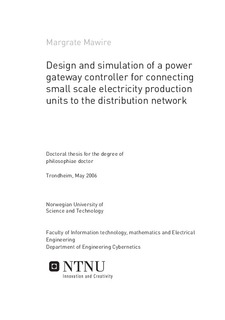| dc.contributor.author | Mawire, Margrate | nb_NO |
| dc.date.accessioned | 2014-12-19T14:00:53Z | |
| dc.date.available | 2014-12-19T14:00:53Z | |
| dc.date.created | 2008-02-22 | nb_NO |
| dc.date.issued | 2006 | nb_NO |
| dc.identifier | 123335 | nb_NO |
| dc.identifier.isbn | 82-471-7956-3 | nb_NO |
| dc.identifier.uri | http://hdl.handle.net/11250/259420 | |
| dc.description.abstract | Electricity markets have been opening up for more local production units, due to large transportation costs and large daily and seasonal load fluctuations. Even small scale producers are gradually getting permission to deliver to the power markets. In some countries, there are electricity consumers who have the possibility for small industrial purposes. Such customers could install electricity production units on their premises, and they could produce excess electricity to sell if they were given the opportunity to do that. In a few countries, plans are underway to fully open up the electricity market to enable these small scale electricity producers to participate.
Integrating the customer units with the utility may on one hand, maximise the use of other available energy resources, whilst on the other hand, significantly reduce the power demand on the network. In addition, utilities desire to provide their customers with necessary information on electricity prices, payments and need for energy by frequent messages throughout the day. In view of the above, there is an interesting aspect to design a unit that monitors market prices, and controls local production and consumption, to optimize the economy of a small scale producer. Such a unit is described as a power gateway controller.
The thesis outlines an experiment of such a system, and simulates different typical load and price situations, to evaluate if such a unit could be beneficial from the point of view of the small scale producer. The thesis is not about analysing investment and infrastructure costs of setting up small scale electricity production units. It is mainly about the technicality of designing a power gateway controller, minimization of operational costs of electricity, and simulation of a plant for testing the functionality of the algorithm.
This thesis presents a designed and simulated power gateway controller (PGC) which can be used at a customer premises. This PGC has the capability to optimize electricity costs at a customer premises, where there is potential to produce electricity locally, and sell excess electricity to the distribution spot market. Also presented is a simulated model of a plant where the PGC may be used and an experimental set-up which can be used for developmental work and extended study of customer-utility interaction. | nb_NO |
| dc.language | eng | nb_NO |
| dc.publisher | Fakultet for informasjonsteknologi, matematikk og elektroteknikk | nb_NO |
| dc.relation.ispartofseries | Doktoravhandlinger ved NTNU, 1503-8181; 2006:101 | nb_NO |
| dc.title | Design and simulation of a power gateway controller for connecting small scale electricity production units to the distribution network | nb_NO |
| dc.type | Doctoral thesis | nb_NO |
| dc.contributor.department | Norges teknisk-naturvitenskapelige universitet, Fakultet for informasjonsteknologi, matematikk og elektroteknikk, Institutt for teknisk kybernetikk | nb_NO |
| dc.description.degree | dr.ing. | nb_NO |
| dc.description.degree | dr.ing. | en_GB |
